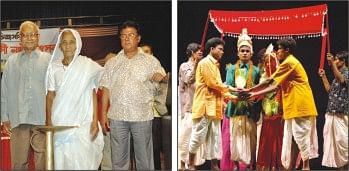Ethnic diversity council and theatre festival begins
Ershad Kamol
Santal artistes in their distinctive attire along with their Bengali counterparts of theatre troupe Aranyak Natya Dal displayed a traditional Santali dance at the National Theatre Stage, Bangladesh Shilpakala Academy, on April 2. The aim of the show was to highlight the solidarity of the pluralistic society in Bangladesh. The dance performance was followed by the inauguration of the five-day ethnic diversity council and theatre festival titled Hor means man in Santali language. The festival was inaugurated by renowned Hajong leader Kumudini Hajong, who had made remarkable contribution to the historic 'Tonko Rebellion' by the community to secure their rights in 1940s against the British Raj. The event was presided over by theatre personality Mamunur Rashid, the convenor of the council. Eminent educationist Professor Sirajul Islam Chowdhury was the chief guest. Chakma Circle Chief of Chittagong Hill Tracks -- Raja Debashish Roy and noted litterateur Selina Hossain were the special guests at the progamme. Sanjib Drong, member secretary of the council, delivered the welcome speech. Other speakers of the programme were Professor Mesbah Kamal, Khasi Minister of Jaflong -- Nirola Tangsang, Professor Dr H K S Arefin, President of Bangladesh Centre of International Theatre Institute -- Ramendu Majumder, President of Shammilito Sankritik Jote -- Nasiruddin Yousuff and Chairman of Bangladesh Group Theatre Federation -- M Hamid. Discussants at the programme said that besides Bengalis, who are the majority, over 45 ethnic groups live in Bangladesh. However, the Constitution of Bangladesh do not recognise them as ethnic groups having distinctive cultural heritage. They are deprived of fundamental rights. Even in the recent census these communities have been recorded as 'tribal people', though they have their distinctive culture. They are always misrepresented in the primary school textbooks, and the government has not declared that books should be printed in the languages of these ethnic communities. All these source from the hegemony tendency of Bengali majority group. And the discussants -- representatives of the Bengali majority -- apologised to the representatives of the minority groups for the ongoing social, political and cultural oppression. Chief guest Professor Sirajul Islam Chowdhury said, "Diverse cultural heritage of Bangladesh cannot be ensured unless discrimination can be controlled." Kumudini Hajong said, "We hope to live together in harmony." Mamunur Rashid said, "A platform should be created to incorporate all the cultural traditions of the Bengali majority as well as all minority groups in Bangladesh. But, we should be careful, so that the traditional art forms of these people are not lost in midst of mainstream Bengali culture. And I believe that this council is just a beginning towards the target." Later, one-minute silence was observed to pay tribute to Chalesh Richil, a Mandi leader who recently died in custody. The final event of the day was staging of a play titled Kania by Sadri Theatre. Written by Brindabon Das, Kania is a melodrama, which features the struggle of a woman -- Phulomala -- and her in laws. Nimai Tikri has translated the play to Sadri, a common language used by 27 ethnic minority groups living in the northern part of Bangladesh such as Onrao, Malo and Malpahari. The play is directed by Mamunur Rashid.
|

(L- R) Professor Sirajul Islam Chowdhury, Kumudini Hajong and Mamunur Rashid at the inaugural session (Left) and a wedding scene from the play Kania (Right). PHOTO: STAR |